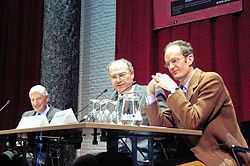Karel van Wolferen
Karel van Wolferen (born 1941) is a Dutch journalist, writer and professor, who is particularly recognised for his knowledge of Japanese politics, economics, history and culture.[1][2]
Career as journalist, writer and academic
After finishing high school, van Wolferen traveled to the Middle East, India and South East Asia, and from 1962 until the 1990s he was based in Japan. In 1972 he became a correspondent for the Dutch daily NRC Handelsblad, reporting from many countries in Asia. In 1987 he received the highest Dutch award for journalism for his articles on the People Power Revolution of 1986 in the Philippines[3] (an uprising which forced President Ferdinand Marcos to flee the country).
His book writing career began in 1969, when he was commissioned to do a study on student radicalism in the West.[4] The result of this was published as Student Revolutionaries of the Sixties, reviewed by the International Herald Tribune as "the best introduction to the subject".[4]
After a career as foreign correspondent, he wrote The Enigma of Japanese Power, first published in 1989, which has sold well over 650,000 copies in 11 languages.[5][6] In Japan this book received enormous attention.[5][6][7] The Asahi Shimbun called it "an elaborate and persuasive study, sharply and careful analyzing a multitude of aspects of Japanese reality". while The Financial Times wrote, "This most thoughtful of books works because it is serious, well informed and, above all, objective".[8]
Since writing Enigma, van Wolferen has authored more than 15 books published in Japanese that explore details of political, economic, social and historical aspects of the Japanese power system. His books have sold more than one million copies altogether.[5] His analyses and policy suggestions have influenced Japanese critics and policymakers,[6] including the reformist politicians who emerged after the political upheaval of 1993. Some of these same politicians now form the core of the party that defeated the LDP in August 2009.
He was made University Professor of Comparative Political and Economic Institutions at the University of Amsterdam in 1997.[2] Since then he has continued to write books and articles for Japanese readers. He divides his time between East Asia and the Netherlands.

In 2005, together with NRC Handelsblad reporter Jan Sampiemon, Van Wolferen wrote Een keerpunt in de vaderlandse geschiedenis (Dutch: "A turning point in the history of the fatherland"). Its secondary title is "A manifesto to the Dutch people". Despite the 'fatherland' in the title referring to the Netherlands, the book is mostly about the changes in the foreign policies of the United States since the presidency of George W. Bush and the effects these have had on the Atlantic partnership.
Political Views since the 1990s
Van Wolferen rejects the global political role of the US since the 1990s and criticizes – particularly in Ukraine crisis – the lack of objectivity and independence of European countries and the coordination of the media in their adaptation to the political objectives of the United States[9][10]
Published books
– ‘Van Eyck to Brueghel’ – 1970, Tudor Publishing Company
– ‘ Student Revolutionaries of the Sixties’ – Oost-West Publishing
– ‘The Enigma of Japanese Power’ – 1989, Alfred A. Knopf
– ‘Nihon wo dosuru ? – Akirameru mae ni, 144 no gimon’ -1991, Hayakawa
– ‘Min wa orokani tamote – Nihon kanryo, dai shimbun no honne’ – 1994, Shogakkan
– ‘Ningen wo koufuku ni shinai Nihon to iu shisutemu’ – 1994, Mainichi (Paperback 2000 Shinchosha)
– ‘Nihon no chishikijin he’ – 1995, Madosha
– ‘Shihaisha wo shihai seyo – senkyomae senkyogo’ – 1996, Mainichi
– ‘Naze Nihonjin wa Nihon wo aisenai no ka – kono fukou na kuni no yukikata’ – 1998, Mainichi
– ‘Okore! Nihon no chuuryuu dankyu’ – 1999, Mainichi
– Amerika wo koufuku ni shi sekai wo fukou ni suru fujouri na shikumi’ – 2000, Diamond
– ‘Nihon to iu kuni wo anata no mono ni suru tame ni’ – 2001, Kadokawa
– ‘Kaiketsu Wolferen no “Nihon waido gekijou”’ – 2001, President
– ‘Wolferen Kyoju no yasashii Nihon keizai’ – 2002, Diamond
– ‘Bush sekai wo kowashita kenryoku no shinjitsu’ – 2003, PHP
– ‘De Ondergang van een Wereldorde (vertaald) – 2003, Contact – Amsterdam, ISBN 90-254-1880-5
– ‘Amerika kara no “dokuritsu” ga Nihonjin wo koufuku ni suru’ – 2003, Jitsugyo no nihonsha
– ‘Sekai no asu ga kessuru hi – beidaitouryousengo no sekai wa dou naru no ka?’ – 2004, Kadokawa
– ‘Sekai ga Nihon wo mitomeru hi – mou Amerika no “zokkoku” de iru hitsuyou wa nai’ – 2005, PHP
– ‘Een Keerpunt in de Vaderlandse Geschiedenis (Co-authored with Jan Sampiemon) – 2005, J.M. Meulenhoff, ISBN 90-290-7698-4
-‘ Mou hitotsu no sakoku – nihon wa sekai de koritsu suru’ – 2006, Kadokawa.
– ‘Nihonjin dake ga shiranai Amerika “sekaishihai” no owari’ – 2007, Shokumashoten
See also
Notes
- ↑ http://japanfocus.org/-Karel_van-Wolferen/3155
- ↑ 2.0 2.1 http://www.businessweek.com/2000/00_44/b3705126.htm
- ↑ "About the Author", The Enigma of Japanese Power, Vintage Books, New York, 1990
- ↑ 4.0 4.1 http://www.speakerideas.com/documentenmap/pdf/Karel_van_Wolferen.pdf
- ↑ 5.0 5.1 5.2 http://search.japantimes.co.jp/cgi-bin/fl20070506x1.html
- ↑ 6.0 6.1 6.2 http://www.businessweek.com/2000/00_44/b3705125.htm
- ↑ http://www.tnr.com/blog/the-plank/new-hope-japan-why-i-think-it-could-finally-start-acting-real-democracy
- ↑ The Enigma of Japanese Power (cover), Vintage Books, New York, 1990
- ↑ http://www.nachdenkseiten.de/upload/pdf/20140814_vanWolferen_TheUkraine_de.pdf
- ↑ http://scotthorton.org/interviews/2014/08/15/081514-karel-van-wolferen/
External links
|